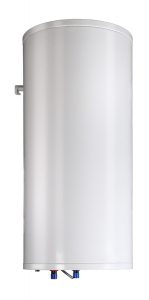 When water meets metal, there’s a danger of corrosion starting. Corrosion is a chemical reaction between water and metal in the presence of oxygen, and the damage it causes to metal can quickly ruin many types of appliances as it weakens the metal until it starts to crumble away.
When water meets metal, there’s a danger of corrosion starting. Corrosion is a chemical reaction between water and metal in the presence of oxygen, and the damage it causes to metal can quickly ruin many types of appliances as it weakens the metal until it starts to crumble away.
The water heater in your home is primarily made of metal and it stores and circulates water. So why doesn’t it start to rust? Corrosion is rare in water heaters, usually only starting late in the system’s life. there are several reasons for it.
The Tank Lining
The tank of a water heater is usually made of durable steel. But the inside lining is made of glass, which doesn’t corrode. It is possible for cracks in the glass to permit water to reach the metal, which will not only lead to rust but to leaks as well.
The Absence of Air in the Tank
Older water heaters kept a cushion of air at the top of the tank to prevent water pressure spikes. However, allowing air into the tank allowed for corrosion to begin. Newer water heaters remove air entirely from the tank and instead use an expansion tank placed over the main one to absorb the water pressure increases.
The Sacrificial Anode Rod
The name sounds like some sort of magical device in a fantasy movie. And maybe sacrificial anode rods are a bit magical, because through simple action they can prevent corrosion and rust from rapidly ruining a water heater. This rod (also called the cathodic anode rod) runs the length of the center of the tank. It’s made from two different pieces of metal that attract the oxidization ions that cause corrosion. Basically, an anode rod corrodes so the rest of the system won’t, “sacrificing” itself.
Eventually an anode rod will corrode completely, and then the rest of the water heater is at risk. This is one of the reasons that routine professional water heater maintenance is essential. A technician will check on the condition of the sacrificial anode rod and see if it needs to be replaced. Although you can have the plumber show you how to check the anode rod yourself during the middle of the year, it requires a professional to put in a new one to ensure you have the correct type.
When Corrosion Does Happen …
An aging water heater (more than 15 years in service) may start to corrode, no matter its defenses. It might not be from water but from the combustion gases from the burner. Whatever is the cause for corrosion to start to affect the system, it usually means it’s time to replace the water heater. Repairs can’t do much to reverse the development of corrosion.
You don’t need to look far for a plumber in Lake Mary, FL who can take care of any problems you experience with your water heater. Our plumbers work with many types of water heaters, so if corrosion indicates it’s time to have the unit replaced, we can recommend excellent upgrades such as a tankless water heater or heat pump water heater.
Proudly serving Central Florida since 1975: Modern Plumbing Industries, Inc.
